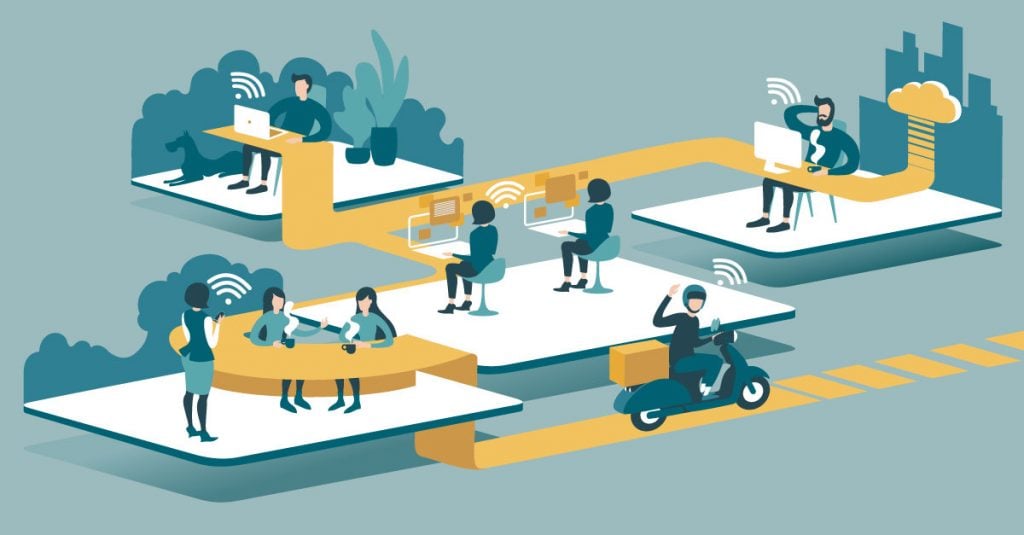The rise of the gig economy has fundamentally reshaped the modern workforce, offering flexibility and new opportunities for millions of people. Platforms like Uber, DoorDash, and Upwork have created a vast network of independent contractors who perform tasks and services on demand. However, this model has also created significant legal and ethical challenges, particularly concerning the rights and protections of these workers. Gig Economy Worker Rights is a rapidly evolving area of law and public policy, as governments, courts, and companies grapple with how to classify these workers and what benefits and protections they should receive. This article will provide a comprehensive overview of the legal landscape surrounding gig workers, exploring the key debates, recent legislative efforts, and the future of work in this new and dynamic economy.
The Fundamental Classification Debate
At the core of the gig economy legal battle is a single, pivotal question: are gig workers employees or independent contractors? This distinction is not merely a technicality; it has profound implications for a worker’s rights and a company’s obligations.
A. The “Independent Contractor” Model: Gig economy companies have, from their inception, classified their workers as independent contractors. This model offers several advantages for the companies:
- Reduced Costs: Companies are not required to pay for employee benefits such as health insurance, retirement plans, unemployment insurance, or workers’ compensation. They also do not have to pay the employer’s share of payroll taxes.
- Flexibility and Control: The independent contractor model allows companies to scale their workforce up or down instantly based on demand, without the legal complexities of hiring and firing employees. They also have less direct control over when and how a worker performs their duties.
- The “Entrepreneurial” Argument: Companies argue that gig workers are small business owners or entrepreneurs who choose their own hours and have the freedom to work for multiple platforms.
B. The “Employee” Argument: Proponents of reclassifying gig workers as employees point to a number of factors that suggest they are not truly independent.
- Lack of Control: While gig workers can choose their hours, they often have little control over the essential aspects of their work, such as the rate of pay, the technology they must use, or the ability to set their own prices. The platform’s algorithms often dictate key decisions.
- Economic Dependence: Many gig workers rely on a single platform for a significant portion of their income, creating a relationship of economic dependence that is characteristic of an employer-employee relationship.
- Misclassification Lawsuits: A wave of lawsuits and regulatory actions has been filed around the world, arguing that gig companies are misclassifying their workers to avoid their legal responsibilities.
C. The Legal Tests: The legal system uses a variety of tests to determine worker classification, often looking at the “economic realities” of the relationship.
- Behavioral Control: Does the company have the right to direct and control how the worker does their job?
- Financial Control: Is the worker able to profit or lose money? Are they reimbursed for expenses?
- Type of Relationship: Is there a written contract? Are benefits provided? Is the relationship expected to continue indefinitely? The application of these tests to the gig economy has led to inconsistent and often conflicting rulings from courts.
The Fight for Worker Protections
Regardless of their classification, gig workers are often left without the basic protections that are standard for traditional employees. The push for Gig Economy Worker Rights is a fight to close this gap.
A. Minimum Wage and Overtime: A cornerstone of employment law is the right to a minimum wage and overtime pay for work beyond a standard 40-hour week. Gig workers, as independent contractors, are not guaranteed either. This has led to concerns that gig work can lead to a race to the bottom, where workers earn less than a living wage after accounting for their expenses.
B. Workers’ Compensation and Injury Protection: When a traditional employee is injured on the job, workers’ compensation provides a safety net. Gig workers do not have this protection. If a delivery driver is in an accident, for example, they are often on their own to cover medical bills and lost income. This gap in protection is a major point of contention.
C. Unemployment Insurance: If a traditional employee loses their job, unemployment insurance provides temporary financial support. Gig workers, by their classification, are ineligible for this benefit. The economic uncertainty of gig work is compounded by this lack of a safety net during times of hardship or when work is slow.
D. The Right to Organize: Traditional employees have the right to form a union and collectively bargain for better wages and working conditions. This right is largely unavailable to independent contractors, making it difficult for gig workers to have a collective voice and negotiate with powerful platforms.
E. Anti-Discrimination Laws: Employment law provides robust protections against discrimination based on race, gender, age, and other protected characteristics. The application of these laws to the gig economy is often murky, leaving gig workers with less recourse if they believe they have been treated unfairly.
Legislative and Regulatory Efforts Worldwide

In the absence of clear court rulings, governments around the world have begun to take legislative and regulatory action to address the unique challenges of the gig economy.
A. California’s AB5: California’s Assembly Bill 5 (AB5) was a landmark law that created a new, stricter test—the “ABC Test”—for determining worker classification. This test presumes a worker is an employee unless the company can prove all three of the following conditions:
- A. The worker is free from the company’s control and direction.
- B. The worker performs tasks outside the company’s usual course of business.
- C. The worker is customarily engaged in an independently established trade, occupation, or business.
- The law was met with fierce opposition from gig companies, who funded a successful ballot initiative (Proposition 22) that exempted them from the law. This legal and political battle highlights the intense nature of the debate.
B. The European Union’s Platform Work Directive: The EU is in the process of passing a new directive that would establish a presumption of an employment relationship for platform workers who meet certain criteria.
- Key Provisions: The directive aims to give gig workers more rights, including a minimum wage, paid leave, and protection from unfair dismissal. It also seeks to increase transparency around the use of algorithms in managing the workforce.
- Impact on the Global Market: The EU directive, like GDPR, has the potential to set a global standard for the gig economy, forcing companies to adopt new practices across their operations.
C. The U.S. Federal and State-Level Push: The U.S. government and several states are also exploring new legislation. The Biden administration has indicated a desire to strengthen worker protections, and states like New Jersey and Massachusetts are considering their own versions of the ABC Test. This patchwork of regulations, however, creates a complex and challenging environment for companies that operate nationwide.
D. The Emergence of a “Third Way”: Some jurisdictions are exploring a “third way” that creates a new class of worker, distinct from both employees and independent contractors. This new class would receive some benefits and protections without being fully classified as an employee. While this approach offers a potential compromise, it also raises new questions about what benefits should be included and how they should be funded.
The Future of Gig Work
The future of gig work will be shaped by the interplay of technology and public policy. As AI and automation become more sophisticated, the nature of gig work itself will change, creating new challenges and opportunities for gig workers and the platforms they work for.
A. Algorithmic Management and Fairness: AI algorithms are at the heart of the gig economy, making decisions about who gets what job, how much they are paid, and who gets suspended from the platform.
- Transparency: The next chapter of Gig Economy Worker Rights will involve a push for greater transparency in these algorithms. Workers and regulators want to know how these systems work to ensure they are not biased or unfair.
- Accountability: There will be a greater push to hold companies accountable for the decisions made by their algorithms, as these decisions can have a direct and significant impact on a worker’s livelihood.
B. The Platform’s Role in a Social Safety Net: The ongoing legal and political debates are forcing a discussion about the role that platforms should play in a modern social safety net.
- Benefit Funds: Some companies are exploring creating benefits funds that workers can use for things like health insurance or time off.
- Portable Benefits: The idea of portable benefits, which are tied to the worker rather than the company, is gaining traction. This would allow a gig worker to build up a fund for unemployment or retirement, regardless of how many platforms they work for.
C. The Evolution of Worker Voice: As gig workers become more organized, they are finding new ways to have their voices heard, from online forums and social media campaigns to traditional union-organizing efforts. The legal system will need to find a way to recognize and support this new form of worker voice.
D. The Global Perspective: The future of gig work will be a global one, with a diverse range of legal and cultural approaches. What works in California may not work in Europe or Asia. The challenge for companies and policymakers will be to create a framework that is both locally relevant and globally coherent.
Conclusion
The gig economy represents a fundamental shift in the social contract of work. It has provided unprecedented flexibility and opportunity, but it has also exposed the limitations of our existing legal frameworks. The fight for Gig Economy Worker Rights is a crucial battle that will determine the future of work for millions of people. It is a story of legal battles, political campaigns, and the resilience of workers who are demanding a fairer system. The path forward is not simple, but it is clear: a successful gig economy must be one that balances innovation and flexibility with the basic human dignity and protections that all workers deserve. The next chapter will be defined by a new social contract, one that acknowledges the unique nature of gig work while ensuring that all workers have a voice, a safety net, and a fair shot at a decent life.












